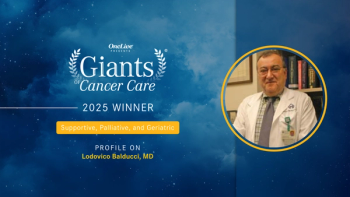
Introduction and Review of the COMPARZ Trial in RCC
For High-Definition, Click
Moderator, Daniel J. George, MD, introduces a panel of leading experts and frontline practitioners who will discuss recent research and clinical developments in the management of renal cell carcinoma (RCC). This panel includes: Robert A. Figlin, MD, Thomas E. Hutson, DO, PharmD, Eric Jonasch, MD, and Brian I. Rini, MD.
The panelists begin the conversation by analyzing late stage trials and key findings from frontline studies, such as COMPARZ and PISCES. In these trials the tyrosine kinase inhibitors (TKIs) pazopanib and sunitinib were compared to each other as a treatment for previously untreated patients with metastatic RCC.
The COMPARZ trial, Figlin notes, was a noninferiority trial that enrolled over 1,000 patients with advanced or metastatic clear cell, renal cell carcinoma. Overall, the median progression-free survival with pazopanib was 8.4 months compared to 9.5 months for sunitinib with a noninferior hazard ratio (HR) of 1.04. Additionally, the median overall survival (OS) was 28.4 months for pazopanib compared to 29.3 months for sunitinib with an HR of .91. These findings, Figlin believes, show that both agents provide similar high quality care.
However, one of the downsides of the COMPARZ trial is that toxicity evaluations were secondary endpoints, Figlin notes. In these evaluations, treatment with pazopanib was better tolerated in terms of the common toxicities for TKIs in the frontline setting. Unfortunately, Figlin adds, given the dosing schedules for each agent, the time point chosen for these evaluations did not result in an accurate comparison.
An overall assessment of the COMPARZ trial indicates that both treatments are active and provide disease control, Rini notes. Additionally, the prolongation of OS in this study is the longest that has been reported. However, subtle nuances exist for each treatment, Rini suggests. As a result, both Rini and Hutson recommend becoming very familiar with one of these treatments, rather than both, since they deliver similar clinical benefits. There is consistently a balancing act between maintaining dose intensity and quality of life, Hutson elaborates. A high level of familiarity with one of these treatments will provide the best opportunity to make dose modifications and handle toxicity, Hutson believes.





































